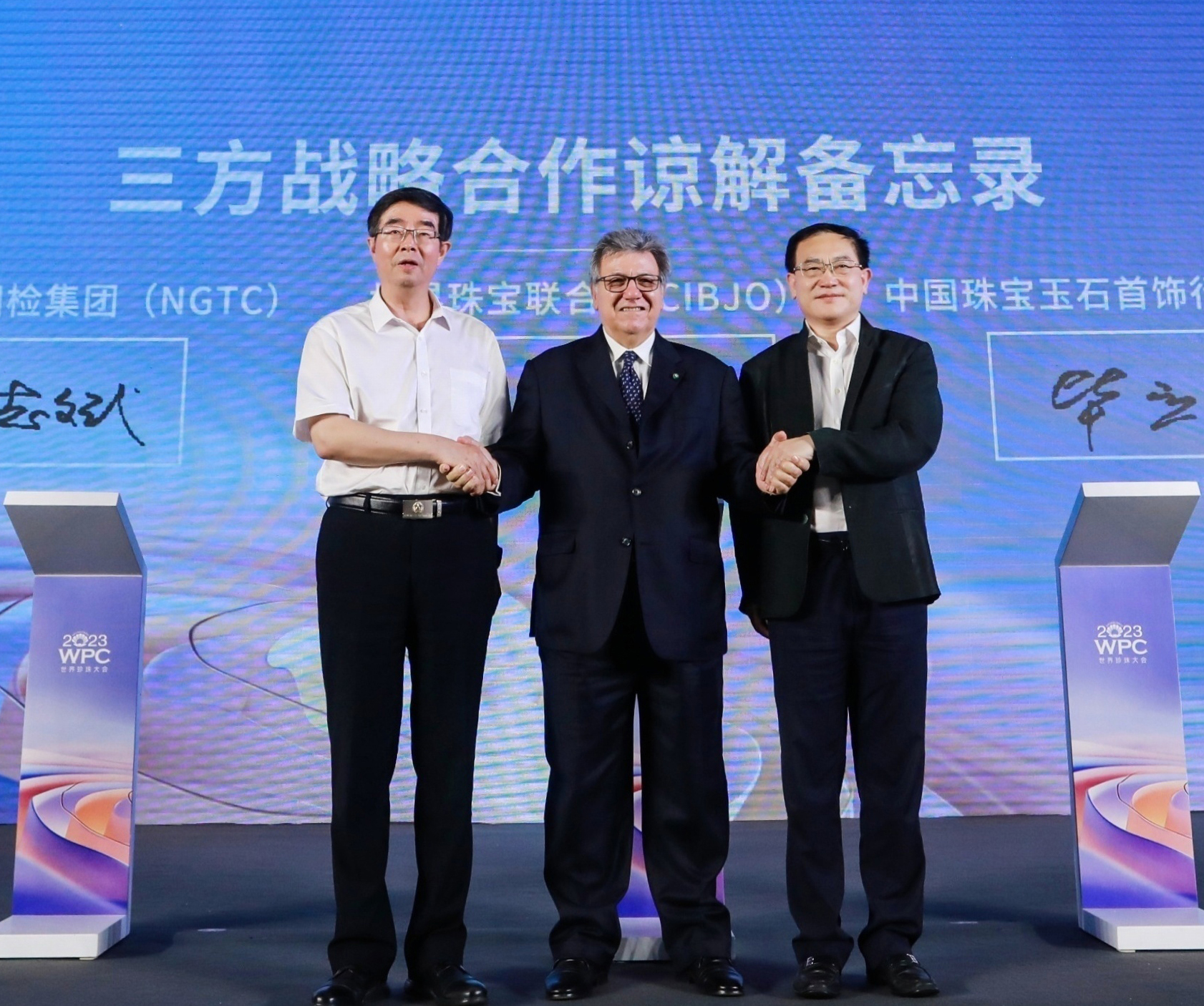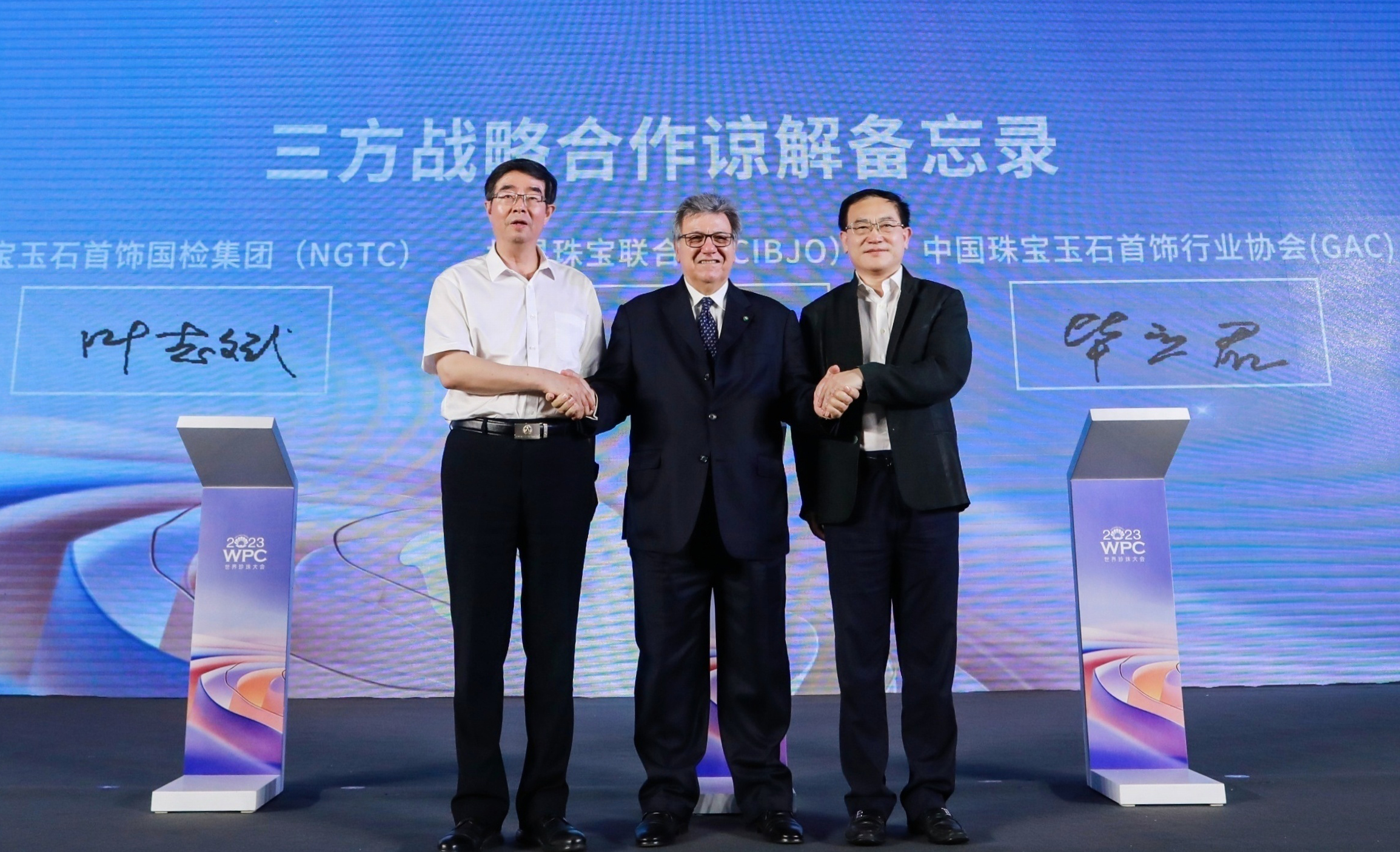Industry faces new challenges in post-COVID world,
CIBJO President tells pearl conference in Zhuji


CIBJO President Gaetano Cavalieri (centre), flanked by Ye Zhibin (left), Chairman of the Board of the National Gems and Jewellery Testing Centre (NGTC), and Bi Lijun, General Secretary and Vice President of the Gems and Jewelry Trade Association of China (GAC), during the opening of Global Pearl Development Conference in Zhuji, China
MAY 22, 2023
With the world finally emerging from the restrictions imposed during the COVID crisis, the jewellery industry is now required to compete without certain of the strategic advantages it had during the pandemic, and this is occurring during a period of economic slowdown in many regions, CIBJO President Gaetano Cavalieri told the Global Pearl Development Conference in Zhuji, China, on May 21, 2023.
With travel restrictions now relaxed, Dr. Cavalieri, a keynote speaker, addressed the opening of the third edition of the event in person, after having done so by video at the previous two conferences. Zhuji, is recognised by the Chinese government as “China’s capital of the pearl,” and is the world’s largest freshwater pearl distribution centre.
“The entire COVID period illustrated the inherent resiliency of the fine jewellery market, despite the very severe pressure that was imposed on economies around the world because of lockdowns and disruptions to chains of distribution,” Dr. Cavalieri said. “What we typically saw was that, after an initial dip in demand for our products as consumers came to terms with the new situation, there was a recovery, with sales thereafter frequently stronger than they were before entering the crisis. Indeed, in 2021, most indicators showed results that were better not only when compared to 2020, the first year of the crisis, but also stronger than in 2019, before it even began.”
“But now, with the pandemic thankfully in the rear-view mirror, the advantages we enjoyed have been reduced, and possibly worse, because, after three long years being confined close to home, consumers are keen to travel and enjoy the physical world around them,” the CIBJO President continued. “This is also happening at a time of economic slowdown in many countries, and in markets like China, where the situation is improving, the double-digit growth rates that we once knew are unlikely to return.”
But Dr. Cavalieri denied that he is pessimistic about the future. “I remain convinced that the product we sell is remarkably robust,” he stressed. “It also addresses a fundamental human predisposition to express emotion and appreciation with objects of value and beauty. We have known that for centuries and there is no reason to believe that it will ever change.”
“But, we do need to be cognizant of changing consumer demand, and this includes the insistence that the products they buy are sourced responsibly and provide societal benefit as well. There are intangible elements to value, and these include integrity – both of the jewellery product and jewellery supply chain,” Dr. Cavalieri continued.
Cultured pearls, the CIBJO President said, represent a jewellery category with particularly high market potential. This is because they are among the very few materials used by the industry that are potentially sustainable both from a social and an environmental perspective.

CIBJO President Gaetano Cavalieri participating in a seminar at the Global Pearl Development Conference, which looked at international standards in the cultured pearl sector.
“In fact,” he noted, “when cultured pearls are farmed in a responsible manner – meaning that the physical environment in which the oysters are hatched and grow is absolutely pristine – then the quality of the end product is optimised. It is a win-win situation.”
During his visit to China, Dr. Cavalieri signed a Memorandum of Understanding with Ye Zhibin, Chairman of the Board of the National Gemstone Testing Centre (NGTC) of China, and Bi Lijun, General Secretary and Vice President of the Gems and Jewellery Trade Association of China (GAC), in which the three organisations agreed to cooperate in the sharing of knowledge and expertise, to create joint programmes, and to advance the adoption in China of international standards and nomenclature developed within CIBJO.
